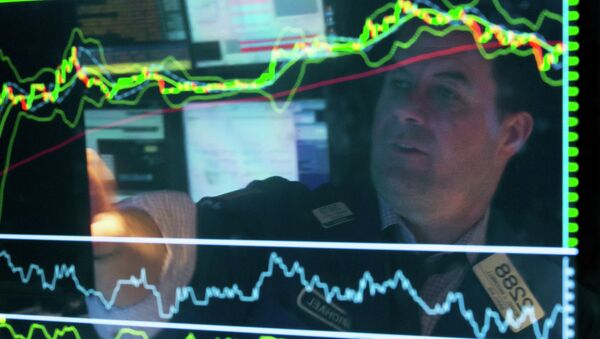Kristian Rouz — Late Tuesday and early Wednesday trading saw global equity markets in disarray, with selling prevailing on Wall Street due to the perceived negative effects of a stronger dollar.
On Wednesday, Asian markets posted gains mostly, with investors continuing their exodus from mainland China via the Stock Connect scheme, resulting in gains on Hong Kong bourse; while Bank of Japan’s (BOJ) decision to keep bond-buying in place only fueled traders’ optimism. Early trading in Europe has been dominated by bullish sentiment on the news of Royal Dutch Shell likely acquiring BG Group.
Wall Street ended Tuesday in the red with utilities shares posting the greatest losses, and the entire corporate sector nervous over the potentially negative effects the stronger dollar is having on their profits and overall performance. The S&P utilities sector was down 1.1% at the close, weighing on the general S&P 500 Index, down 0.21%.
The Dow Index fell only some 0.03%, while Nasdaq Composite retreated 0.14% after Bank of America lowered its profits outlook for 2015 by $2 per share, prompting investors to sell some of their BofA portfolio. The bank cited a stronger dollar as the main reason for the declining overseas earnings. Twitter, however, climbed 4% on the news they hired advisors in order to avoid a takeover by a larger player.
In Asia-Pacific, equities advanced for a fifth consecutive session, driven by gains in materials and healthcare sectors. The MSCI index of Asia-Pacific shares rose 0.1% as the Bank of Japan, after a two-day policy meeting, decided to keep its massive bond-buying program of economic stimulus in place. Inflation is pushing the Japanese regulator toward even more easing, however, robust economic growth figures suggest further stimulus is unlikely to be seen until late October.
According to the World Economic Outlook report, released by the IMF Tuesday, the principal issue of today’s global economy, preventing it from returning to fast-paced expansion, is insufficient investment. In such circumstances, Obama administration’s decision to increase government spending in order to spur domestic investment does not seem bad at all.
The Nikkei 225 Index rose 0.8%, surpassing its 15-year high as Japanese companies’ earnings are solid due to a stronger dollar and a weaker yen.
Australia’s S&P/ASX 200 and the Kiwi NZX 50 added 0.1%, while Korea’s Kospi was flat. In mainland China, Shanghai Composite added 2.5%, hitting its 7-year high as weak macroeconomic data suggest Beijing will soon implement a full-scale stimulus program. As the Chinese Communist government is a ‘black box’, there is a high level of market uncertainty regarding its future economic policies. This is the reason for today’s significant flight of investment money from the mainland to Hong Kong.
Buying bets placed on Hong Kong shares over the Stock Connect scheme quickly overwhelmed the daily quota of $1.7 billion on Wednesday after Beijing widened funds’ access to equities with more policy changes anticipated. The Hang Seng China Enterprises Index rose 4.3% on the highest daily equity sales in Shanghai. The general Hang Seng Index rose 2.6% to its highest since 2008.
The US dollar has recovered from losses it suffered due to softer employment data, rising to $1.0835 against the euro, and advancing to as much as 120.34 yen before settling at 119.90 yen.
European stocks are gaining ground in early Wednesday trading on the news of Royal Dutch Shell buying BG Group for $70 billion, the first large-scale acquisition in the oil industry of this decade. Equities of BG skyrocketed by 39%, for other energy shares to follow. BP rose 4.4%, Repsol advanced 2.4%, Total rose 0.9%, and Tullow Oil added 9.8%.
Consequently, the FTSEurofirst added 0.2%, extending Tuesday’s gains.
The Saudis, on their part, said they would keep the monthly average pace of oil output at 10 million bpd, after having been producing some 10.3 million bpd in March. Saudi oil minister Ali al-Naimi also stated that OPEC is unlikely to decrease oil output, especially after Iran returns to the market.
The Brent benchmark of crude stands at $58.38/bbl, while US futures with delivery in May offer some $52.95/bbl.





